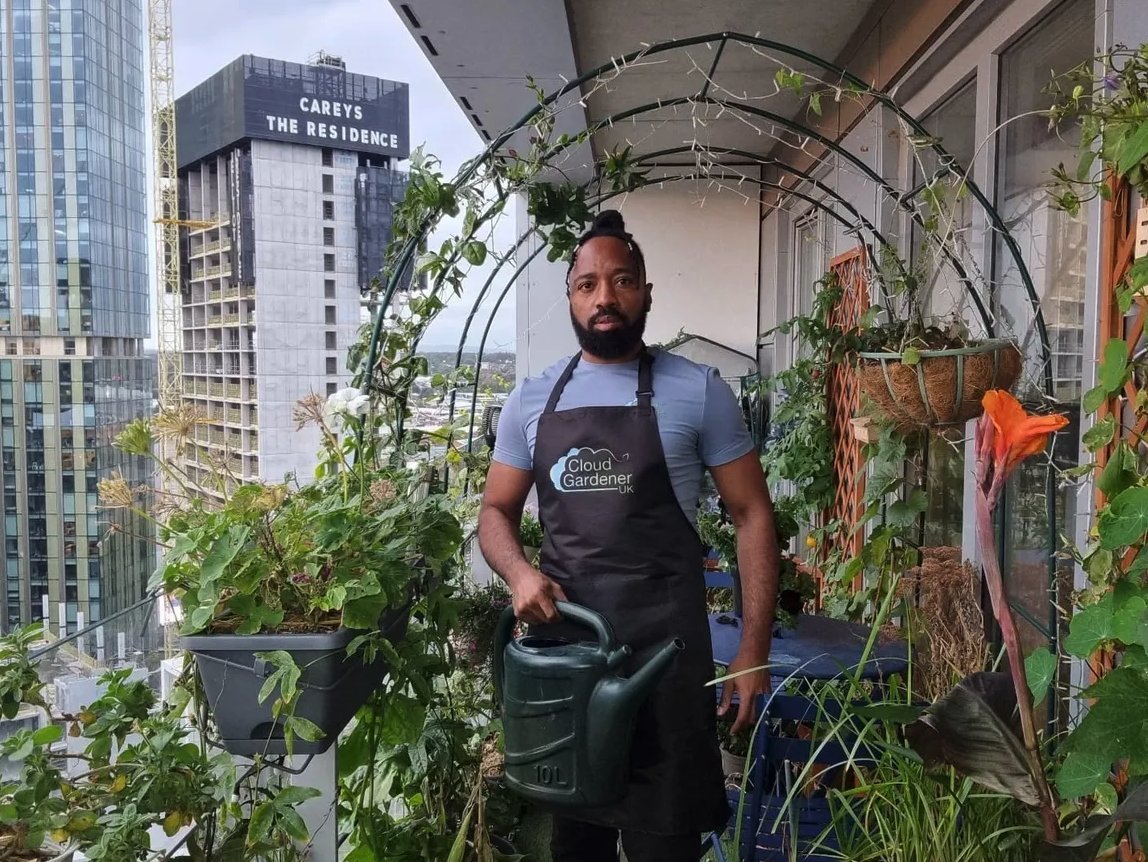Urban greening & rewilding
Sunrise from the Cloud Garden, Manchester. Jason Williams
Urban greening and rewilding reduces surface water run-off and brings urban cooling benefits.
Projects also have the potential to contribute to canopy cover, support biodiversity, and bring the multitude of benefits nature can have on our health to urban residents.
Urban greening and rewilding projects across the city vary greatly in scale. Even small-scale woodlands and patches of green space provide a significant boost for local biodiversity and canopy coverage. These can be local street and alleyway greening, often led by residents and charities.
Other schemes can be led by commercial and public investment in neighbourhood greening schemes. Manchester recently welcomed a new 6.5-acre Mayfield Park, sitting at the centre of a major regeneration scheme.
Manchester Urban Diggers
Manchester Urban Diggers CIC (MUD) is a social enterprise, working to create food system change and empower communities. They create grassroots, people-led farming projects growing food that can be shared and sold.
Manchester Urban Diggers -
MUD develop disused urban areas as a small but important part of the means of production. This cultivation can play a role in climate adaptation by reducing stormwater run-off, providing urban cooling and proving access to locally sourced, healthy and nutritious food, the supply of which is less vulnerable to disruption from severe weather.
MUD’s main site is a former bowling green in Fallowfield, South Manchester: Platt Fields Market Garden. In 2021 the site produced over 900kg of food on just half an acre of land. As well as providing vital urban greening with benefits for climate adaptation, this project has improved the soil health, air quality and biodiversity of the area. MUD has also provided over 3000 hours of health and wellbeing provision in the form of Green Prescribing in 2021.
For further information, or to join as a volunteer, visit MUD’s website: https://www.wearemud.org/
Good to Grow & Sow the City
Good to Grow (the new name for the Big Dig) is an online platform to support food growing in the UK, run by Sustain. The purpose of the network is to get local communities and individuals involved in their local community garden.
Good to Grow has an interactive map that can be used by prospective volunteers to find schemes and projects close to them.
The Good to Grow Manchester partner is Sow The City. Sow the City is a social enterprise that delivers projects to develop community greenspaces, improve green infrastructure, connect people with nature, improve mental and physical health, and provide food education.
Sow the City also offer design consultancy and research expertise.
The Cloud Gardener
Jason Williams - Manchester’s ‘Cloud Gardener’
Jason Williams - the Cloud Gardener - is an award winning gardener who, during the Covid lockdown in 2020, turned his balcony in a high-rise residential block in Manchester into an urban oasis.
Jason wants to inspire a new generation of urban gardener. His work demonstrates that even the smallest spaces, including balconies, can be used to bring benefits for climate adaptation, as well as bio-diversity and human health and well-being.
His ‘Cirrus Garden’ was displayed at RHS Chelsea in 2022. Many elements of the garden were sourced from Manchester based nurseries and small businesses, including plants from Chorlton Plant Nursery and Hulme Garden Centre.
The work of the Cloud Gardener has been featured across the national press. He has made several appearances on broadcast channels, including featuring on the BBC’s Gardeners’ World and ITV’s This Morning.
Jason is active across social media outlets. Follow him using the links below
Manchester City Football Club
Manchester City Football Club are engaged in a long-term effort to improve the landscaping around the Etihad stadium and across the wider campus.
Since 2014 the Club planted over 2000 mature trees and some 5km of mixed hedgerow.
The Club is responsible for seven acres of wild grasses and wildflower meadow.
The Club is completing a detailed land CO2 sequestration study across its own sites and the wider Campus to help understand the benefits of all planting and ecology.
Revitalised canal side at City Football Academy, Manchester
Wildflower garden - MCFC
Planting and habitat creation outside City Football Academy
MCFC wildflower planting
Green wall at Studio 1, Manchester City Football Club (Academy)
Further information
City of Trees planting guides:
https://www.cityoftrees.org.uk/resource/planting-guides
Bruntwood - I Want Plants website:









